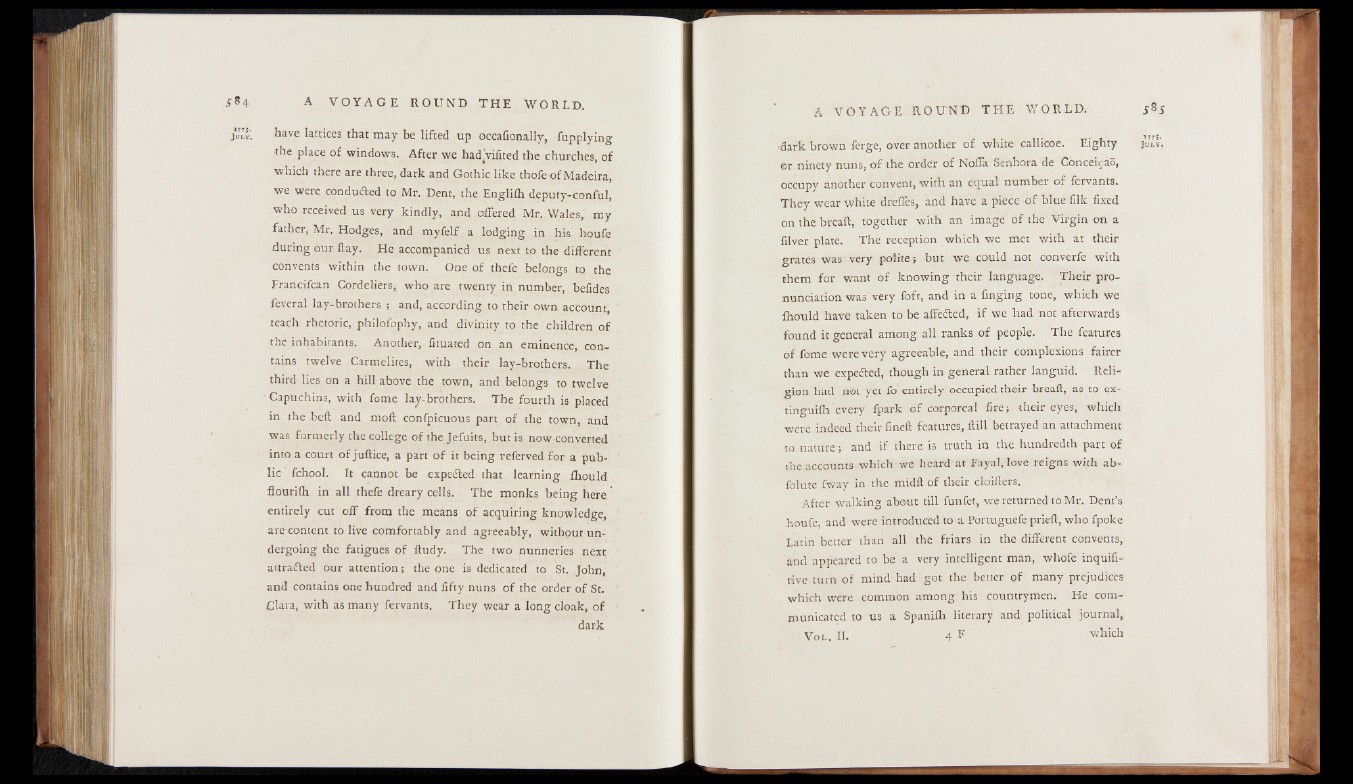
juLy. have lattices that may be lifted up occafionally, fupplying
the place of windows. After we hadjvifited the churches, of
which there are three, dark and Gothic like thofe of Madeira,
we were conduced to Mr. Dent, the Englifli deputy-conful,
who received us very kindly, and offered Mr. Wales, my
father, Mr. Hodges, and myfelf a lodging in his houfe
during our flay. He accompanied us next to the different
convents within the town. One of thefe belongs to the
Francifcan Cordeliers, who are twenty in number, befides
feveral lay-brothers ; and, according to their own account,
teach rhetoric, philofophy, and divinity to the children of
the inhabitants. Another, fituated on an eminence, contains
twelve Carmelites, with their lay-brothers.. The
third lies on a hill above the town, and belongs to twelve
Capuchins, with fome lay-brothers. The fourth is placed
in the bell and moft confpicuous part of the town, and
was formerly the college of the Jefuits, but is now converted
into a court of juftice, a part of it being referved for a public
fchool. It cannot be expedited that learning fhould
flourilh in all thefe dreary cells. The monks being here
entirely cut off from the means of acquiring knowledge,
are content to live comfortably and agreeably, without undergoing
the fatigues of ftudy. The two nunneries next
attracted our attention; the one is dedicated to St. John,
and contains one hundred and fifty nuns of the order of St.
Clara, with as many fervants. They wear a long cloak, of
dark
■ dark brown ferge, over another of white callicoe. Eighty
er ninety nuns, of the order of Noffa Senhora de Conceicao,
occupy another convent, with an equal number of fervants.
They wear white dreffes, and have a piece of blue filk fixed
on the breaft, together with an image of the Virgin on a
filver plate. The reception which we met with at their
grates was very polite ; but we could not converfe with
them for want of knowing their language. Their pronunciation
was very foft, and in a finging tone, which we
fhould have taken to be affected, if we had not afterwards
found it general among all ranks of people. The features
of fome were very agreeable, and their complexions fairer
than we expected, though in general rather languid. Religion
had not yet fo entirely occupied their breaft, as to ex-
tinguifh every fpark of corporeal fire; their eyes, which
were indeed their fineft features, ftill betrayed an attachment
to nature; and if there is truth in the hundredth part of
the accounts which we heard at Fayal, love reigns with ab-
folute fway in the midft of their cloifters.
After walking about till funfet, we returned to Mr. Dent’s
houfe, and were introduced to a Portuguefe prieft, who fpoke
Latin better than all the friars in the different convents,
and appeared to be a very intelligent man, whofe inquifi-
tive turn of mind had' got the better of many prejudices
which were common among his countrymen. He communicated
to us a Spanifh literary and political journal,
Vol. II. 4 F which
*775*
Ju l y ,